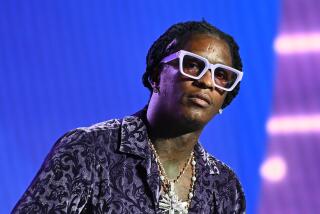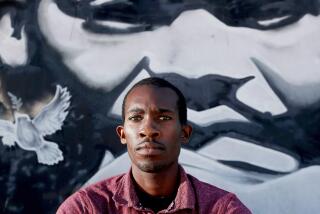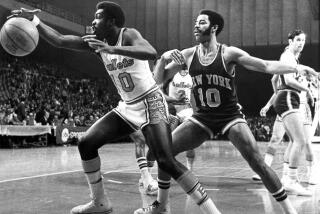Put Away the Rope in the Iverson Case
- Share via
As Allen Iverson, the Philadelphia 76ers’ talented yet troublesome superstar guard, surrendered to West Philadelphia authorities Tuesday, a familiar debate was heating up on the national talk- radio landscape: Is it racist to call a young black man from the ‘hood a thug if his behavior seems to warrant it?
My answer would be no. But that doesn’t mean the vigor with which the “thug” accusation is sometimes made doesn’t rankle me.
As probably most know by now, Iverson is accused of forcing his way into a West Philadelphia apartment July 3 in search of his wife, then threatening its two male occupants with an unregistered handgun.
Cornrow-headed and thickly tattooed, Iverson--a product of the mean streets of Newport News, Va., and openly proud of it--has the look, the attitude and the growing list of troubles with the law necessary to make him a model for the thug life.
How, his detractors want to know, can anyone, black or white, muster the nerve to deny anyone the right to call so obvious a punk a punk?
Here’s how: A lot of us are sickened by the zeal with which Iverson and the like (yes, even O.J. was an example) are nailed to the cross. No matter how guilty of a crime the accused might turn out to be, a lynching is still a lynching.
Criticizing a man in the open court of public opinion is one thing, but virtually hanging him in the town square without a trial is quite another.
Generations of unenviable experiences have taught us African Americans how to recognize the difference.
When talk-show hosts and media commentators take to the task of attacking a black individual accused of a crime--even something as alarming as that which Iverson may indeed have committed--with a vitriol that should be reserved for white-collar sociopaths like Enron’s Kenneth Lay and WorldCom’s Bernard J. Ebbers, whose misdeeds affect the lives and futures of millions, no one should be surprised when black people either rush to the defense of the accused or refuse to add their voices to that of the mob calling for his head.
Should Iverson’s life growing up on the battlefields of Newport News have any bearing on the kind of man he is today?
To his harshest critics, the answer is a simple and emphatic no. They believe that once Iverson made the National Basketball Assn. big-time, he should have shed the physical and psychological trappings of his past experiences like an old coat. After all, who needs a killer attitude and homies from the ‘hood when nobody’s holding a gun to your head anymore?
But whereas I and many other black Americans would concur that Iverson’s street mentality has no intrinsic value in his role as a sports icon, we also understand that the matter of “keeping it real”--which is to say, following a code of behavior one’s very life has literally depended on for years--is not so easily discarded. Or, at the very least, it should not be treated as a nonissue in the discussion of Iverson’s inability (or reluctance) to straighten out his act.
Naturally, none of these explanations for the refusal of some in the African American community to take part in Iverson’s on-air persecution mean anything to his most vociferous assailants. Iverson is a monster in their book, and anyone who would dare even request that they put down their torches and terminate their march upon “Iverson Castle” is only an apologist for him.
They miss the point.
Iverson’s defenders aren’t really debating his qualifications as a thug as much as they are asking his eager-beaver, would-be executioners a simple question: Aren’t there bigger monsters in the world more deserving of such unbridled passion?
More to Read
Go beyond the scoreboard
Get the latest on L.A.'s teams in the daily Sports Report newsletter.
You may occasionally receive promotional content from the Los Angeles Times.










